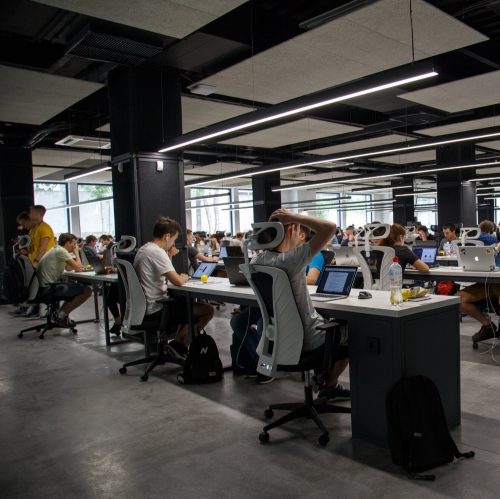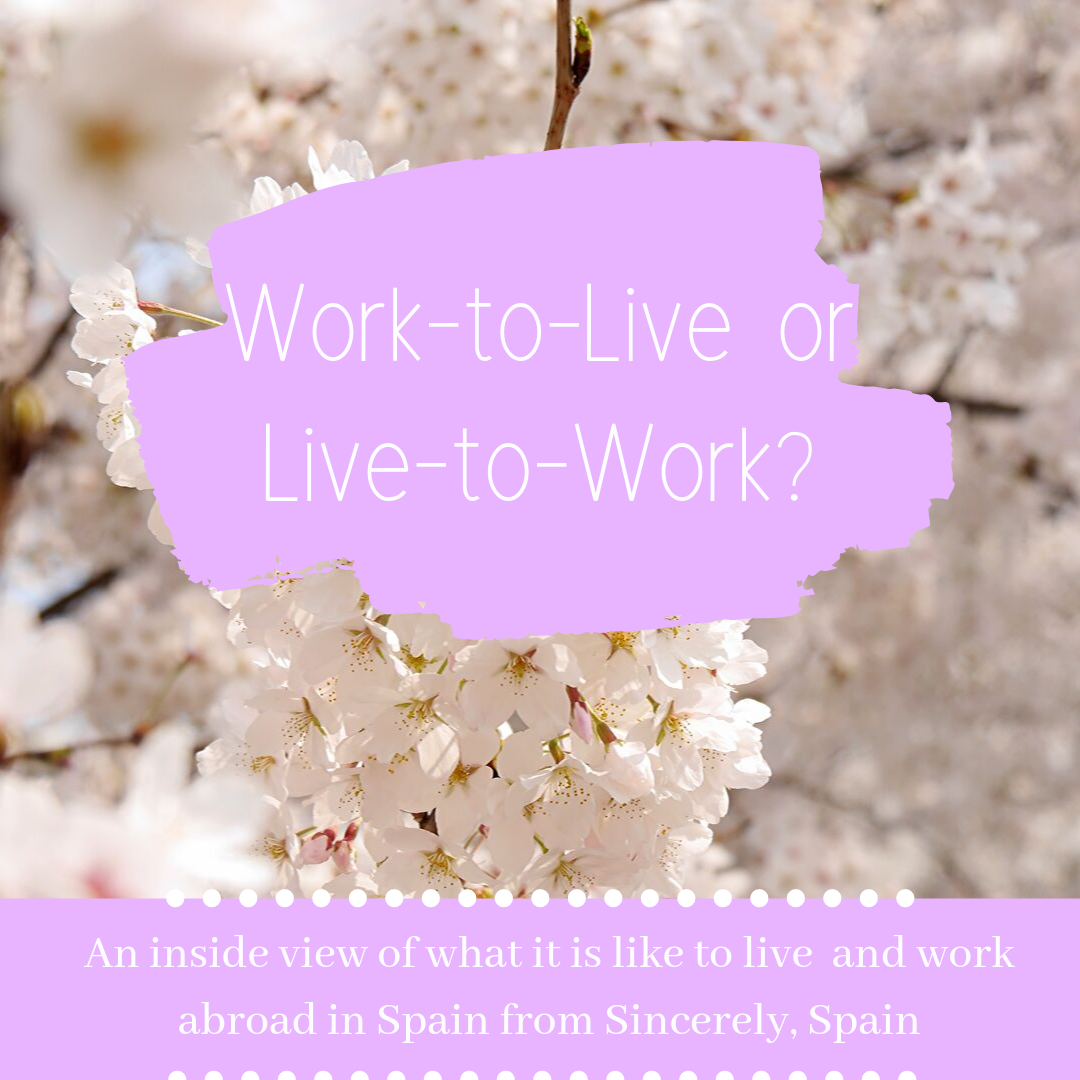
Work-to-Live vs. Live-to-Work
Dear Laura,
When you arrive to Spain, you will probably notice that there is a different vibe going on when it comes to work than back home. People seem to be less worried about what they have to do for work and spend more time enjoying themselves on a daily basis. Here you might find that it is acceptable to take breaks for coffee/breakfast in the morning or finish the day early (and even more so in the south of Spain). As opposed to the U.S.―where many times it feels like we only live to be able to do our jobs―in Spain many people work the minimum to have the life that they want here-and-now. This means that most of the time they value time with family and friends over a couple of extra hours at the office, and that this perspective on life is socially accepted.
 One of the main ways we can see this difference in the way of life is with the funcionarios, the people who work for the government (civil servants applied to all levels of work). The people who fill these roles work in jobs from public administration to at the post office, including teachers, doctors, police officers, etc. To be able to get a job as a funcionario, it is necessary to study for an exam called oposiciones. People usually study for one to three years or more to become a funcionario because not only is it hard to pass, but you also have to do well enough to get selected for a job, competing with others who take the same exam. (Now you are probably thinking that we have gone off on a tangent, explaining something that has nothing to do with the work-to-live philosophy, but bear with us a little while longer.)
One of the main ways we can see this difference in the way of life is with the funcionarios, the people who work for the government (civil servants applied to all levels of work). The people who fill these roles work in jobs from public administration to at the post office, including teachers, doctors, police officers, etc. To be able to get a job as a funcionario, it is necessary to study for an exam called oposiciones. People usually study for one to three years or more to become a funcionario because not only is it hard to pass, but you also have to do well enough to get selected for a job, competing with others who take the same exam. (Now you are probably thinking that we have gone off on a tangent, explaining something that has nothing to do with the work-to-live philosophy, but bear with us a little while longer.)
It is the dream of many Spanish young people to become funcionarios, despite the horrible oposiciones. Why? Because once you have a job working for the government they cannot fire you unless something really traumatic happens. That’s right, not only will you have a government salary and access to private insurance (two other pluses), you will have a job for life! This means that many people work or would like to work in these positions, even if they are not passionate about the job. They work-to-live and they don’t have to go above and beyond their tasks in order to maintain their position.
This, in turn, has created a culture where coffee breaks are compulsory (even at a non-funcionario position, everyone will probably have a 30 minute coffee break) and weekends are untouchable. This also means that the motivation to improve is completely linked to one’s personal desire which, on occasion, can make it seem like improvement is rare in situations where people do the job simply because they have to. This can be a difficult mentality to adjust to at first. However, the flipside is that daily life (outside of work) is much more important to a lot of people than their advancement in their careers, which can also be refreshing. People work to go out for cañas and to pay for holidays, but nothing extravagant, and many people don’t have the desire to change what they are doing for more. Instead, they are happy to live for the moment.
 Does this mean that no one who works is passionate about the jobs they do? Absolutely not! We know teachers and psychologists and police officers who love what they do and who are constantly looking for ways to improve and be the best they can. In addition, in cities where there are not enough funcionario jobs to go around, many people are having to become innovative and create their own companies, putting in the extra hours it requires to be successful. And this is just as much work as anywhere else in the world! At the end of the day, however, in Spain we can see a high importance given to down time, family time, time for eating, etc.
Does this mean that no one who works is passionate about the jobs they do? Absolutely not! We know teachers and psychologists and police officers who love what they do and who are constantly looking for ways to improve and be the best they can. In addition, in cities where there are not enough funcionario jobs to go around, many people are having to become innovative and create their own companies, putting in the extra hours it requires to be successful. And this is just as much work as anywhere else in the world! At the end of the day, however, in Spain we can see a high importance given to down time, family time, time for eating, etc.
This means you might find yourself in a paradoxical situation. Working for international companies can be amazing but it also means having to work long hours and under pressure to create, innovate, and be successful in general. Of course, there are things that Spaniards might have less of than if they would work more. However, it also means that while people might not have the most money or the fanciest jobs, their standard of living is pretty high because they spend a lot of time doing things they love.
 And while accepting these differences is something that can be quite difficult for people that come from a live-to-work culture like the U.S., there is also something we really enjoy about living here. In fact, we would highly recommend you try and see how people around you are living their day-to-day lives while abroad in Spain because it might just give you something to think about long-term for what you want out of life.
And while accepting these differences is something that can be quite difficult for people that come from a live-to-work culture like the U.S., there is also something we really enjoy about living here. In fact, we would highly recommend you try and see how people around you are living their day-to-day lives while abroad in Spain because it might just give you something to think about long-term for what you want out of life.
What do you think? Would you choose a work-to-live culture over what you have back home?
Sincerely,
Spain





4 Comments
Casale.candoit@gmail.com
Work as ‘funcionario’ all your live can be very borring! Specially if you aren’t passionate about the job… Many of them get sick, beacause they are not happy. This is a double problem because the system won’t be efficient if workers don’t care and are mentally sick.
However, I agree the solution is not to work in a private company for many many hours. There are many statistics that shows how workers are more efficient (and more happy) when they work around 6 – 7 hours. Automation and robotics are here to help us… we should work less.
Finamlly, just one more thing… work in what you like!
Don’t worry a lot about the future, enjoy what you do, and learn something new everyday, or you will became a very sad zombie. Maybe a zombie with free time.
Sincerely, Spain
Definitely appreciate your feedback, Daniel! 🙂
I think you have a lot of good points- happy workers are good (and efficient) workers so that is what the government, companies, and individuals should look for. It’s what’s better for everyone in the long run. Unfortunately, it’s not always the priority but I hope more and more people come to see things from your perspective.
If you work in what you love, you’ll never have to ‘work’ a day in your life (it’s cheesy, but also so true)…
theanswerissunshine@gmail.com
After moving back to the US from working as an auxiliar, I miss the freedom and also self peace that came with working in Spain and their view on work. I also found myself saving money for travels, prioritizing my health, and the people I love, while in the US that may come off as not the greatest work ethic. The understanding Spaniards have towards health and well-being is amazing and I miss it dearly.
Sincerely, Spain
Thanks for your input Jennifer! It is funny how sometimes, while the culture shock has big impact on us, the reverse culture shock is almost harder to deal with. Good for you on finding your own balance between work ethic and prioritizing your health and the people you care about!